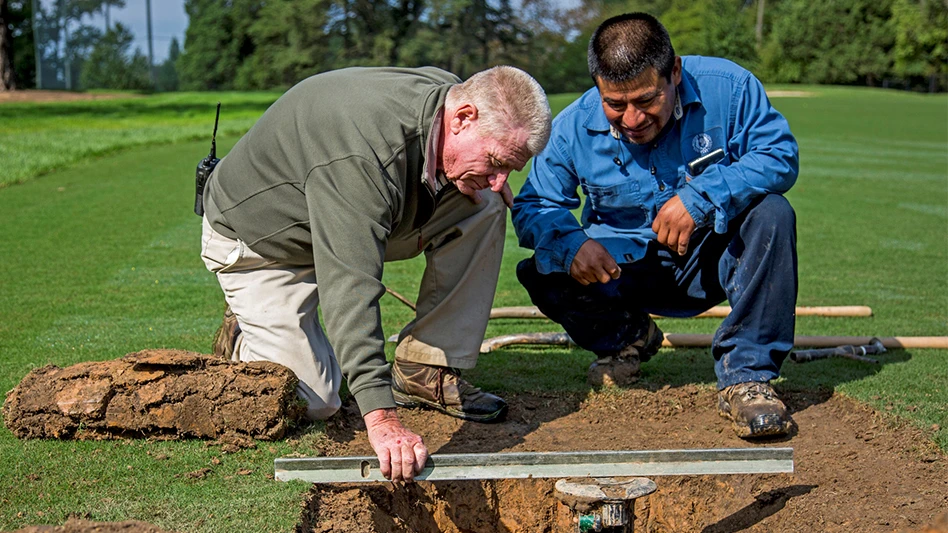
The first time I had to replace my assistant superintendent was 2004. I had been superintendent here at Avalon Golf Club for a couple years when the assistant I had inherited moved on.
I posted the job locally in western Washington, as well as nationally through the GCSAA job board. As I recall, I got quite a few strong candidates, especially nationally, and hired an assistant from Montana who wanted to move out here with his wife to be close to his parents, who themselves had recently moved into the area. This fellow was with me 15 years before securing his own superintendent job at a nearby course late in 2019.
My second assistant search, at the end of 2019, nearly resembled the first one. Although I didn’t receive as many responses, I ended up with a handful of strong candidates, ultimately hiring a local fellow from Seattle who had been an assistant at a private club for a few years but wanted to get out of the city and move north. Avalon Golf Club, located in Burlington, Washington, is about 60 miles north of Seattle.
This hire was with me for about three and half years before he decided this past summer that he wanted to switch industries and go back to school. He’d had enough of golf course maintenance. Burned out with the amount of work he had to do combined with a salary that, frankly, is not as competitive as other industries.
In early August, off I went to my computer to post the job once again, both locally through the WWGCSA, and nationally again with the GCSAA.
To say the responses to the ads were a bit quiet would be an understatement. By late October, I had received a grand total of one interested party, and he fizzled out rather quickly.
I kept checking the job boards through August, September and into early October, and I took a rather shocked note of just how many open assistant jobs there were out there. It was a bit mind-boggling. My ad literally moved down the board into relative obscurity almost daily. Assistant job posting upon assistant job posting quickly buried my own ad.
I reconsidered my ad, seeing if there was perhaps a little editing I could do to make it stand out a bit. The wage seemed more than competitive to other similar postings. I should emphasize competitive within the industry. In fact, I found there was nothing much I could do to the ad itself, or the pay we were offering. The posting should have spoken for itself and drawn interest.
So, why hasn’t it? Why has my open assistant position sat there like an unopened Snickers on the breakroom table?
I don’t think there’s a simple answer. As I looked into it, I realized it’s a bit of a complicated issue.
One of the things I did before posting my latest assistant opening was to make a phone call to a well-respected, long-tenured superintendent in the area to get a feel for the salary I should post. Instead of just getting assistant salary ranges from him, we ended up in a full-blown discussion about the state of the industry itself in regard to young men and women entering our business — or, more to the point, the lack thereof.
Vance Much is superintendent at Semiahmoo Golf Club in northern Washington, a resort right up on the Washington/Canadian border. Vance has been at Semiahmoo even longer than I’ve been at Avalon, about 32 years now. “For a lot of reasons, mostly political within the ownership and structure of the club, I haven’t had an assistant since 2008,” he told me. “But a couple years ago I decided I was ready for an assistant and have been rather aggressively pursuing this ever since.”
I must admit, hearing him say, “aggressively pursuing hiring an assistant for the PAST COUPLE OF YEARS,” threw me for a bit of a loop. How could filling his assistant position be that difficult? Two years?
“I’ve seen the postings for assistant positions in our area out there too,” Vance said. “It’s unreal the very competitive salaries (industry competitive) being posted at some of the private clubs in the Seattle area, and those jobs are seemingly either not getting filled, or taking forever to fill.”

I wondered aloud to Vance that when our postings sit out there untouched, what exactly are we to do to try and fill the positions?
“I’ve wondered just that,” Vance said. “I guess I could contact Oregon State, because Washington State doesn’t have a program anymore, but then Oregon State is moving more toward research. There just isn’t the ground floor education base for wannabe assistants like there used to be for us in this region.”
And, based on the extreme amount of open assistant positions nationwide, this does not seem to be a regional problem. Perhaps we need to start thinking outside the box when faced with the challenge of not finding enough people to fill our open positions.
A couple of things come to mind:
- Hiring people outside the industry who we think just might be a workable fit somehow.
- Promoting someone currently on your crew who, even without the traditional turfgrass education, but with training, might be able to do the job.
As far as the first idea — hiring people perhaps educated and even experienced outside the industry — Vance suggested I contact another longtime superintendent in our area, Dave Bocci at Bellingham Country Club, who had a unique situation of his own with a possible non-traditional hire.
“I had a guy on the crew who was a chemistry major at Western Washington,” Dave told me when I gave him a shout. “He worked for me for about three years part-time while going to college and loved working on the course. After he graduated, he hinted to me how much he was interested in my profession, despite his chemistry degree. He worked in a lab for about six months and hated it, and ended up coming back to the course and is pretty much working full-time for me while taking the online turfgrass program at Penn State pursuing his master’s.”
Dave mentioned that although this fellow is not one of his assistants, he is kind of treating him like one, having him work under one of his assistants.
The other “outside the box” idea is promoting someone currently on the staff. Again, this will most likely mean hiring someone without a turf degree. The challenge I see here is how much time a superintendent will need to devote to training that individual — time that, most likely, an overworked superintendent without an assistant is not going to have. But maybe it is the only option in some instances. Combine this personalized training with online education and there might be, for some situations, at least, a solution? Vance agreed that maybe this is the direction superintendents are going to have to explore going forward.
“Maybe this is an avenue a lot of people have to approach now,” he said. “Maybe they don’t have to go to the four-year or two-year program and sit in a classroom. Maybe we have to treat the golf course as the classroom, with online education something they can do while working full-time.”
In addition to his chemist who is now in training to become an assistant, Dave told me he’s had a couple other guys on the crew going through the Penn State online program during the last few years.
It seems like this trend might be the way forward for many superintendents who, like me, experience difficulty filling an open assistant position the traditional way. Based on the response so far to my ads for an assistant, it looks like thinking outside the box is going to be necessary going forward for many of us.
Get curated news on YOUR industry.
Enter your email to receive our newsletters.

Explore the December 2023 Issue
Check out more from this issue and find your next story to read.
Latest from Golf Course Industry
- Beyond the Page 65: New faces on the back page
- From the publisher’s pen: New? No way!
- Indiana course upgrades range with synthetic ‘bunkers’
- Monterey Peninsula CC Shore Course renovation almost finished
- KemperSports and Touchstone Golf announce partnership
- PBI-Gordon Company hires marketing manager Jared Hoyle
- Mountain Sky Guest Ranch announces bunker enhancement project
- GCSAA names Joshua Tapp director of environmental programs






